THE POLITICS OF
BUDGET CONTROL
THE POLITICS OF BUDGET CONTROL: CONGRESS, THE PRESIDENCY AND THE GROWTH OF THE ADMINISTRATIVE STATE
John Marini, Ph.D.
University of Nevada, Reno
Published by Taylor & Francis
2 Park Square, Milton Park, Abingdon, Oxon, OX14 4RN
270 Madison Ave, New York NY 10016
Transferred to Digital Printing 2009
THE POLITICS OF BUDGET CONTROL: Congress, tbe Presidency and tbe Growth of the Administrative State
Copyright 1992 by Taylor & Francis New York Inc. All rights reserved. Printed in the United States of America. Except as permitted under the United States Copyright Act of 1976, no part of this pubIication may be reproduced, stored in a retrieval system, or transmitted, in any form or by any means, electronic, electrostatic, magnetic tape, mechanical, photocopying, recording or otherwise, without the prior written permission of the copyright owner.
1 2 3 4 5 6 7 8 9 0 E B E B 9 8 7 6 5 4 3 2
This book was set in Times Roman by Hemisphere Publishing Corporation. The editors were Lisa Speckhardt and Radhika Rao Gupta, the production supervisor was Peggy M. Rote, and the typesetter was Laurie Strickland. Cover design by Thmmy Marshall.
A CIP catalog record for this book is available from the British Library.

The paper in this publication meets the requirements of the ANSI Standard Z39.48-1984 (Permanence of Paper)
Library of Congress Cataloging in Publication Data
Marini, John
The politics of budget control : Congress, the presidency, and the growth of the administrative state / John Marini.
p. cm.
includes bibliographical references and index.
1. BudgetUnited States. 2. Government spending policyUnited States. I. Title.
HJ2052.M368 1992
| 353.0072'221dc20 | 91-40591 |
| ISBN 0-8448-1716-3 (case) | CIP |
ISBN 0-8448-1717-1 (paper)
Publisber's Note
The publisher has gone to great lengths to ensure the quality of this reprint but points out that some imperfections in the original may be apparent.
To my mother, Margherita Marini, the memory of my father,
Dominic A. Marini (18981984), and Nancy and Francesca
Contents
The federal budget has attained unparalleled significance at the heart of American politics in the last quarter of the twentieth century. The modern budget system has become the mechanism by which a distinctively American administrative state was put in place and made operative. However, the administrative state rests uneasily within the structure of the Constitution of the United States. In terms of legitimacy, the American tradition is one of limited, constitutional government. State theory presupposes the unlimited capacity of government to pursue public purposes. The presence of an American administrative state has produced a disjunction between the theoretical and practical dimension of national politics, between the principles that legitimize action and the practice of the institutions of government. The administrative state rests upon theoretical assumptions that cannot gain constitutional legitimacy. The attempt to consolidate an administrative apparatus within the framework of American government has had the effect of undermining the efficient operation of the constitutional system of separated powers. It has made it more difficult for the institutions of government to function amicably in pursuit of a national interest. It is for this reason that the relations between the political branches of government, Congress, the presidency, and the bureaucracy have become increasingly hostile in the last decades.
In America, the administrative state traces its origins to the Progressive movement. Progressive leaders were hostile to the Constitution because it presupposed a limitation upon the power of government. The executive budget system was among the most important political reforms demanded by Progressives. A presidential budget, along with party reform, would allow activist presidents the ability to pursue the interests of a national majority. Consequently, the United States was the last modern industrial nation to adopt an executive budget system. Congress was reluctant to give presidents the authority to formulate budgets, because it was thought such prerogative would undermine the separation of powers. Fifty years later, the move to increase the legislature's powerand reduce the president's controlover the budget, arose from the realization that the president and the national majority constituted the greatest threat to the continuation of an administrative bureaucracy committed to the achievement of social justice. Throughout much of American history, conflict over control of public finances had been contained because of a consensus concerning the purposes and size of the federal government. Administrative functions at the national level were few, in keeping with a constitutional system which underscored the limited character of all government.
The growth of the administrative state began the process of undermining the consensus in support of limited government. Subsequently, it also eroded support for limited or balanced budgets. Moreover, the president and Congress, the national majority and the organized interests, became rival forces and constituencies committed to purposes that were often adverse to the national interest. The president, responding to a majority, came to oppose the consolidation of the administrative state. Congress and the organized interests developed a stake in the maintenance of administrative centralization. The federal budget, a potential instrument for fueling the growth of the administrative state, subsequently came to be the point of control from which both political branches attempted to maintain, expand, or limit the size of the public sector. The failure of the institutions of government and the political parties to achieve a new consensus, or political realignment, concerning the purposes and level of public spending by the national government made budget control nearly impossible. The Constitution, which separated the powers of government, provided the conditions for budget strife.
By the middle 1970s, the struggle for control of budgets and bureaucracies had become the central battleground in executive-legislative relations. The national budget, with taxing and spending power, had become the focal point of the American administrative state. It was the place where political institutions and public bureaucracies attempted to accommodate the various interests and constituencies seeking a share of the national wealth. The growth of the public sector, which accompanied the increased size of public budgets, began a process that undermined the distinction between the public and private sphere, between government and society. Moreover, it became increasingly difficult for the political institutions to recognize the difference between governing and budgeting. At one time, there was widespread agreement that governments should tightly control expenditures; budgets provided the means of limiting claims based upon available resources. Moreover, there was a consensus concerning the federal government's administrative functions: they were few. This was not merely because state and local governments undertook most administrative tasks, but because of agreement concerning the autonomy of the economic marketplace, and the distinction between the public and private sphere.

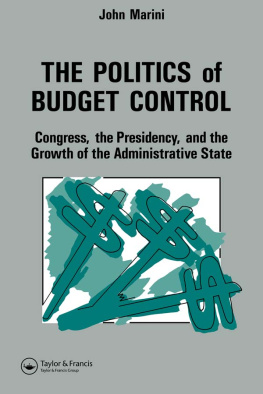

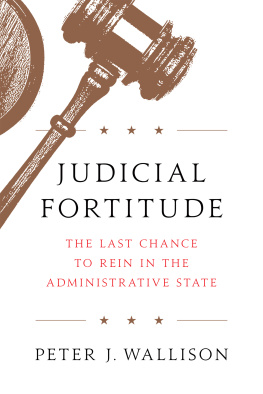
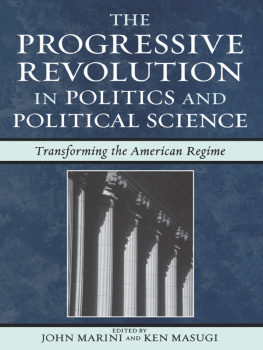

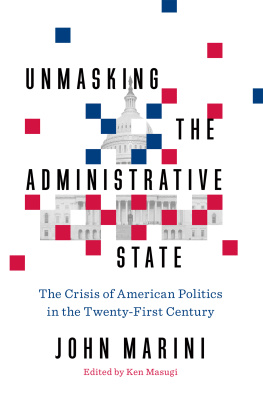
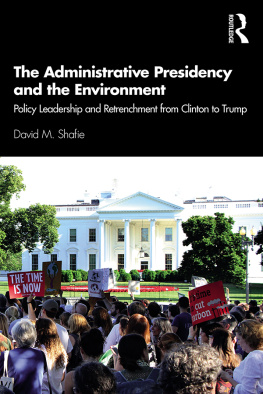
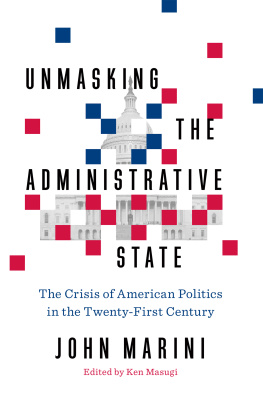
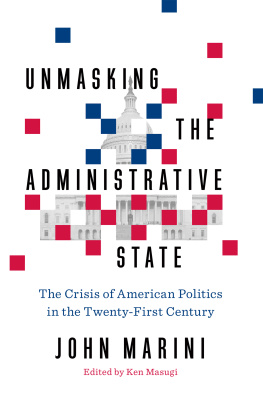
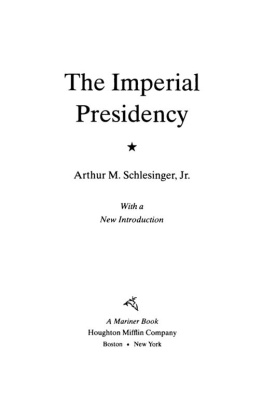

 The paper in this publication meets the requirements of the ANSI Standard Z39.48-1984 (Permanence of Paper)
The paper in this publication meets the requirements of the ANSI Standard Z39.48-1984 (Permanence of Paper)